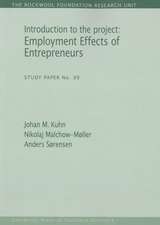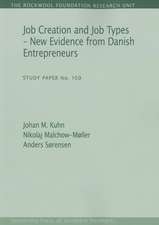The Dynamics of Wage Relations in the New Europe
Editat de Linda Clarke, Peter de Gijsel, Jörn Janssenen Limba Engleză Paperback – 7 oct 2012
| Toate formatele și edițiile | Preț | Express |
|---|---|---|
| Paperback (1) | 947.85 lei 6-8 săpt. | |
| Springer Us – 7 oct 2012 | 947.85 lei 6-8 săpt. | |
| Hardback (1) | 953.97 lei 6-8 săpt. | |
| Springer Us – 30 ian 2000 | 953.97 lei 6-8 săpt. |
Preț: 947.85 lei
Preț vechi: 1155.91 lei
-18% Nou
Puncte Express: 1422
Preț estimativ în valută:
181.37€ • 197.63$ • 152.83£
181.37€ • 197.63$ • 152.83£
Carte tipărită la comandă
Livrare economică 23 aprilie-07 mai
Preluare comenzi: 021 569.72.76
Specificații
ISBN-13: 9781461370024
ISBN-10: 1461370027
Pagini: 368
Ilustrații: XII, 351 p.
Dimensiuni: 155 x 235 x 19 mm
Greutate: 0.51 kg
Ediția:2000
Editura: Springer Us
Colecția Springer
Locul publicării:New York, NY, United States
ISBN-10: 1461370027
Pagini: 368
Ilustrații: XII, 351 p.
Dimensiuni: 155 x 235 x 19 mm
Greutate: 0.51 kg
Ediția:2000
Editura: Springer Us
Colecția Springer
Locul publicării:New York, NY, United States
Public țintă
ResearchDescriere
he debate on 'The Dynamics of Wage Relations in the New Europe' is an T offspring of a research project on 'Disparities in Wage Relations and the Reproduction of Skills in Europe'. At a meeting of the advisory committee for this research held at the University of Westminster in London on 14th November 1994, it was decided (by Linda Clarke,]orn]anssen, Henryk Lewandowski, Philippe Mehaut, Patrick Rozenblatt and Frank Wilkinson) to set up a larger international committee to develop a programme and seek funding from the European Commission for a symposium of experts on wage relations. This committee of ten scientific experts was formed and invited to a number of meetings throughout 1995 and 1996 by DG V of the European Commission in order to develop a programme and proposal for a symposium to take place in 1997. Eventually the proposal, formally submitted by University of Westminster/London, University ofMaastrichti Netherlands, Fachhochschule Dortmund/Germany and University of Osnabriick/ Germany was accepted by the European Commission in May 1996. Additional funding was then obtained from the Hans-Bockler-Stiftung and the Dutch Organisation for Scientific Research allowing, in particular, participants from Central and East European countries to be invited. The subject of wage relations, as a central issue of European social policy, was intended to be tackled in an open debate between scientists and policy makers, the latter as individual experts rather than representatives.
Cuprins
Abbreviations. List of tables. List of figures. Preface. General Introduction. Wage relations and European wage policy; L. Clarke, et al. Part 1: The regulation of wages in the European states. Introduction. The transformation of wage labour and the state; J. Janssen. The national and EU-state in the regulation of wages and the composition of the wage package; G. Széll. Discussion. The historical process of wage information. Legal origins of wage labour: the evolution of the contract of employment from industrialisation to the welfare state; S. Deakin. Changing wage orders: France 1900-1995; J. Saglio. Discussion. The composition of the wage package. The anatomy of labour cost; J. Edling. Social security contributions, earmarked taxes and wage earner savings in the financing of social protection: a comparison of the British and French systems; B. Friot. A financial reform of the welfare system: reforms are overdue; C. Schnabel. Discussion. The transformation of wage relations in Central and Eastern Europe. Negotiated wage growth in Hungary; L. Héthy. The wage crunch in Central and Eastern Europe: past effects and future risks; D. Vaughan-Whitehead. Discussion. General debate. Conclusions. Part 2: Wage forms, the reproduction of labour and living standards. Introduction. Disparities in wage relations and social reproduction; L. Clarke. Social reproduction and the labour process. Occupational and wage hierarchies: an historic turning point; P. Rozenblatt. Wages systems and social systems; M. Bolle de Bal. Discussion. The reproduction of labour. Wages and living standards in the Central and East European countries; I. Ékes. Migrant labour and equal pay for equal work in Europe; E.Gross. Discussion. The reproduction of the social structure. Wages as a reflection of socially embedded production and reproduction processes; A. Picchio. The restructuring of the family wage system, wage relations and gender; I. Bruegel. Recent changes in wage forms and the reproduction of the social structure: the underlying issues; P. Concialdi. Discussion. General debate and conclusions. Part 3: Competition, the market and changes in work organisation. Introduction. Welfare effects of market deregulation and changing work organisation &endash; some unresolved issues; P. de Gijsel. Deregulation and labour market performance. The impact of labour market regulation on economic performance: a review; B. Enjolras. Systemic competition between high and low `social cost' labour: a case study of the UK construction industry; M. Harvey. Increasing competition and changing work organisation. Cooperation, the organisation of work and competitiveness; F. Wilkinson. Alternative work systems and the competitive process; S.J. Konzelmann, A.M. Birecree. Post-Fordism and managerial strategies in France; T. Coutrot. Pay structure and competitiveness; P. Jansen. Summary of the discussion; P. de Gijsel. Index. Contributors.














